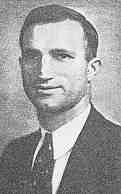The Accordion at Oklahoma City University
An institution of higher education which is doing pioneer work in giving college credits toward a degree for the study of the accordion
by Louis Ronchetto -- Instructor

by Louis Ronchetto -- Instructor

The day is not far off, I believe, when all Universities will give the
accordion the place it deserves in their curriculum. Oklahoma City
University is merely the first to do this. Here the accordion is placed
on equal footing with the other instruments and regular college credit is
granted to students properly enrolled in the University. Credit earned
for work done on the either [sic] in the College of Fine Arts or accordion
counts towards a degree in the College of Liberal Arts.
Besides the regular college work, we offer instruction to preparatory
pupils--this is, pupils of high school and grade school age--who will
eventually enroll in the University and receive regular college credit for
their work. Some of the most promising pupils are grade school children.
Our greatest difficulty right now is suitable music for group work. If one is able to arrange music he should do so as much as possible, as he knows better than any one else what his pupils can do. Much of our music I arrange myself, but nothing pleases me better than to find a number suitably arranged and ready to pass out.
Some one once said that Man is simply a bundle of habits. How true that is! With that thought in mind, a great deal of my time is spent, not in teaching a child music, but in developing the right kind of habits of practice and study. I firmly believe that ninety per cent of our music troubles are due, not to insufficient practice, but to practice of the wrong kind.
Take fingering, for instance. An easy selection can be played using almost all fingers that you wish, and it is so easy for a teacher to let a pupil use any fingering he wishes, as long as the music sounds all right. But the idea to keep in mind is that you are not teaching that pupil a particular piece of music, but that you are developing in him the habit of following, or not following, correct fingering. With my beginning pupils I always insist that they follow the fingering as marked, even though at times they may be able to play a passage better by using different fingers. Advanced pupils, of course, can try several fingerings and follow the one best suited to them. However, they should always use the same one, once they have decided.
The same is true of rhythm. The successful teacher will always insist that the rhythm be correct, no matter how slow the piece may have to be played. The idea that should be driven home to the pupils is that accuracy comes before speed. If the pupils takes care of accuracy, speed will take care of itself.
The habit of slow practice is one of the most important to develop in a pupil, and, I will say, one of the hardest. A good teacher will try to make a pupil realize that it isn't how many times a passage is played that counts, but how many times it is played correctly. How useless it is to play a passage over and over incorrectly, say ten times and nine times, and yet the average music student will do exactly that.
The habit of practicing in sections and practicing the difficult places much more than the easy places should be firmly established in pupils. Too many times pupils begin at the beginning and play all the way through a piece before stopping, going over the difficult parts hurriedly to get them out of the way.
Last, but not least, the teacher should not get discouraged if progress seems slow at the beginning. If he will just see to it that his pupils develop the right kind of habits of practice and study, in due time he will get the results that he is looking for. Carelessness on the part of the teacher will result in carelessness on the part of the pupil. Get rid of carelessness and ninety per cent of your music troubles will disappear.
The Classical Free-Reed, Inc. staff gratefully acknowledges volunteer Patrick Kiley, who assisted in the production of this article, as well as Stanley Darrow and his comprehensive American Accordion Musicological Society library.
| Invitation to Contributors / Submission Guidelines |
| Back to The Free-Reed Journal Contents Page |
| Back to The Classical Free-Reed, Inc. Home Page |